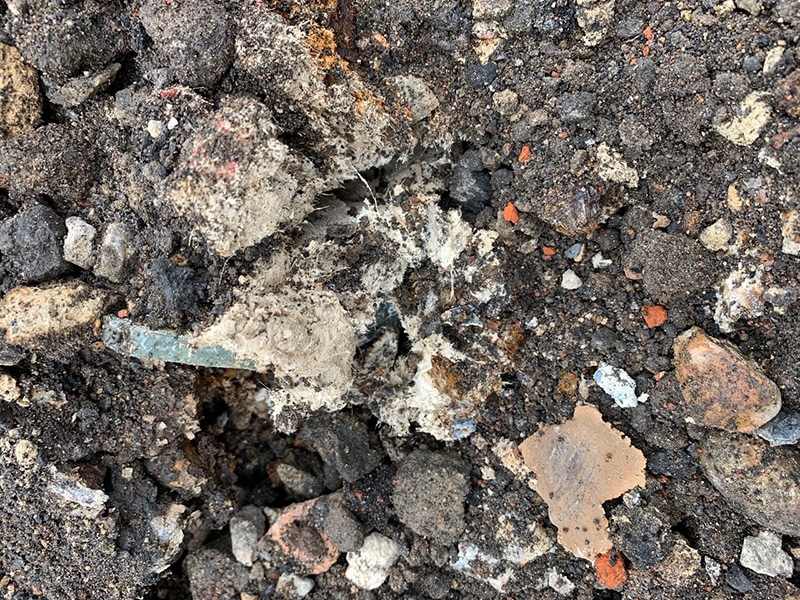How much does an asbestos soil test cost?
As a business owner, contractor, developer, or landlord with responsibility for a particular piece of land in the UK, there are various circumstances in which you may seek to have an asbestos soil test carried out at your site.
Those “triggers” may include you having recently purchased the land, or perhaps your plans to demolish existing buildings at the site ahead of redevelopment.
If you are aware of the land in question being brownfield in nature – perhaps having previously been the site of activities that could present an asbestos contamination risk, such as waste disposal – this is another factor that might lead you to request an asbestos soil test.
Indeed, a particular site having been a focus for industrial use or demolition in the past, or having been an infill site, are all examples of “high-risk” scenarios as far as the potential for asbestos presence is concerned.
All of this leaves a key question, however: even if you do decide to order an asbestos soil investigation for your land, how much can you expect to pay for it? Below, we have taken a closer look at the key things to know about this subject.

What are the legal requirements for asbestos soil testing in the UK?
There are various pieces of legislation in the UK that you will need to account for when managing potentially asbestos-contaminated land, and considering whether to request asbestos soil testing for your site:
The Control of Asbestos Regulations 2012 (CAR 2012)
This is the overarching legislation for the management of asbestos in Great Britain. Although CAR 2012 is more closely associated with the management of asbestos-containing materials (ACMs) in buildings, it also covers situations where asbestos-containing soil or construction and demolition (C&D) materials could be disturbed.
A central element of CAR 2012 is the “duty to manage” asbestos. This duty is imposed on the owners and occupiers of non-domestic premises, the latter potentially including soil contaminated with asbestos fibres.
So, if you would be classed as a “dutyholder” for a given piece of land in accordance with these regulations – which also apply to commercial redevelopment and public spaces, not just buildings – you will be obliged to take reasonable steps to determine the presence and condition of any ACMs at your site.
Such an investigation should be undertaken before any other work is carried out that may disturb the ground.
Construction (Design and Management) Regulations 2015 (CDM 2015)
Various individuals and organisations that are involved in a construction project – such as the client, principal designer, and principal contractor – are subject to certain duties under these regulations.
It is required, for example, for a comprehensive risk assessment to be conducted, in order to identify and manage health and safety risks. This will include any risks related to asbestos in soil.
CDM 2015 imposes an obligation to put in place a construction phase plan – addressing any potential asbestos hazards – before the construction phase starts.
Planning and environmental legislation
Soil testing and remediation plans may also be necessary in order to comply with local planning conditions. By ensuring that any asbestos testing you arrange for your soil involves analysis by a laboratory accredited by the United Kingdom Accreditation Service (UKAS), you can help ensure the resulting data is defensible in legal and planning contexts.
Bear in mind, too, that any disposal of waste from your site – which may include asbestos particles – will need to be carried out in accordance with the Environmental Protection Act 1990 and the Hazardous Waste Regulations.
Remember that any violations of the above laws and regulations could bring a range of potentially serious consequences, such as stop-work orders, fines, and/or prosecution.
What are the typical costs of asbestos soil testing in the UK?
Here at Oracle Solutions, there are two types of site investigations that we carry out for asbestos-contaminated land. These are asbestos in soil testing, and Waste Acceptance Criteria (WAC) testing.
WAC testing is undertaken as a means of determining how soil will behave in the event of it being buried at landfill. This testing generally consists of three stages for asbestos-contaminated land: the initial soil screening, and then gravimetric analysis, and potentially then fibre counting.
We have previously written in detail about the costs of WAC testing, including the factors that influence how much you can expect to pay for this service.
In summary, the following are typical costs for various forms of asbestos soil testing in the UK:
- Entry-level testing: £25 to £100 per sample
- Full site investigations: £395 to more than £3,000
- WAC testing: £375 to £450 per sample.
What factors most heavily influence the cost of testing?
The following elements will all impact on the amount that you can anticipate paying to have your land tested for asbestos:
- The type and complexity of the analysis
- The site of the site, and the numbers of samples to be captured
- The desired turnaround time
- The site location and its accessibility
- Consultant fees
- The laboratory accreditation and legal defensibility.
How do asbestos soil test costs compare to other asbestos surveys?
The types of asbestos surveys that are typically carried out on buildings – including management surveys and refurbishment or demolition surveys – can differ markedly from asbestos soil testing in their cost, complexity, and legal scope.
An asbestos management survey, for instance, is the type of asbestos survey undertaken on buildings to help identify and manage ACMs during the given property’s normal occupation and use. In common with asbestos soil testing, it is carried out under the CAR 2012 framework, and it tends to be non-intrusive or minimally intrusive.
The differences, however, include that asbestos management surveys are focused on buildings rather than soil. Management surveys are also usually broader in scope than asbestos soil testing, often necessitating the visual inspection of multiple areas.
Soil testing is normally more targeted in nature than an asbestos management survey, and a greater number of samples may be required. This may have the effect of particularly driving up testing costs for bigger sites.
Phased investigations also tend to be more common in land-based assessments than is the case with building-focused asbestos surveys. This may have further implications for how you spread out the costs over time.
What are the risks of skipping or undervaluing soil testing?
We touched above on the potential legal consequences of a failure to carry out adequate asbestos soil testing, including ongoing work being forcibly halted, as well as prosecution and fines. If such consequences do come to pass, this could also have adverse impacts on your reputation as an individual and/or organisation.
If you don’t arrange thorough asbestos soil testing, and therefore don’t know the true asbestos situation at your site, this could contribute to eventual project delays and/or cost overruns when you discover asbestos at your land later.
All of this is before we even mention the health risks that unidentified and unmanaged ACMs could pose to workers at your site, and the general public. Remember: even a quarter-century after asbestos was banned in the UK construction sector, diseases related to asbestos exposure are still responsible for around 5,000 deaths per year in this country.
Can you test yourself or should you hire a professional?
Concerns about the costs involved with asbestos soil testing might have led you to consider whether the use of a “DIY” asbestos testing kit could be a good idea, as an alternative to professional asbestos testing services.
The basic idea behind a DIY asbestos soil testing kit is that you would collect the asbestos soil samples yourself, followed by sending them to a laboratory for analysis. DIY kits typically include such items as sampling instructions, personal protective equipment (PPE – such as gloves and a mask), and a sampling bag.
We have written in the past in some detail about home testing kits versus professional testing for asbestos, and much of what we stated there applies to “DIY” asbestos soil testing, too.
The bottom line is that while the lower upfront price of a DIY asbestos soil testing kit can be understandably attractive, such kits can vary considerably in their quality, and can present concerns with regard to their accuracy, reliability, and legal compliance.
While it is not explicitly illegal to use a DIY asbestos soil testing kit in the UK, CAR 2012 stipulates that asbestos testing must be done by competent individuals. Given the risk of improper collection of samples compromising the results, many accredited laboratories don’t accept DIY soil samples for testing.
So, when it comes to ensuring safety, compliance, and peace of mind, we would always recommend that you seek out professional asbestos soil testing services. Such services will entail professionally taken samples being analysed at a UKAS-accredited laboratory.
How much does asbestos soil remediation and disposal add to the costs?
The topic of disposing of asbestos-contaminated soil, and how much this process tends to cost, is another one we have previously addressed in the Oracle Solutions Learning Centre.
But as a quick “takeaway” to help you begin your disposal planning during the initial testing phase, here are some of the costs you might expect to incur for such services:
- Soil excavation and removal: £100 to £200 per tonne
- Transport and landfill: £45 to £250 per tonne.
Summary: what should you budget and plan for?
As with other forms of investigations for asbestos at sites up and down the country, the costs that you will face for the asbestos testing of your soil will depend on a variety of factors, including property type and test method.
By carrying out proper due diligence for your land, and carefully considering what forms of testing would suit your premises, you can help avoid false economies, such as cheap “DIY” testing that fails to produce accurate and dependable results.
To learn more about our own asbestos soil testing and related services here at Oracle Solutions – as can play a critical role in keeping you compliant with relevant regulations and supporting the success of your projects – please don’t hesitate to contact our experts today.

Written by Mark Carter
Mark Carter is a renowned expert in asbestos management, offering clients vital guidance on compliance and safety. His expertise is invaluable for navigating asbestos regulations, ensuring both safety and legal adherence. Mark's role is central in providing effective asbestos-related solutions, helping clients achieve their business objectives with an emphasis on regulatory compliance and safety in asbestos management.
